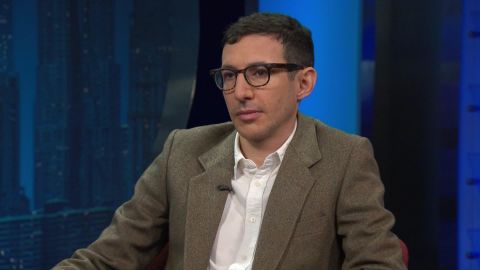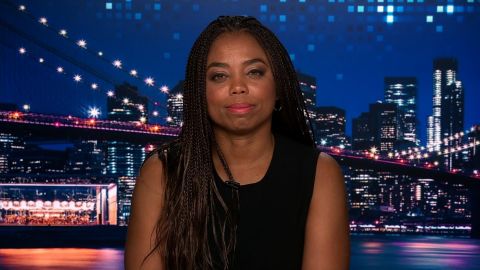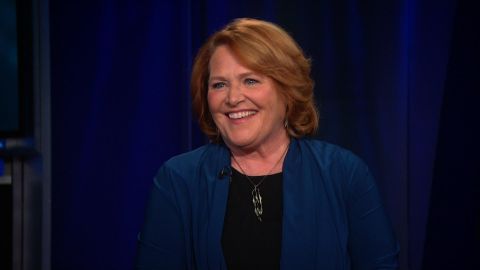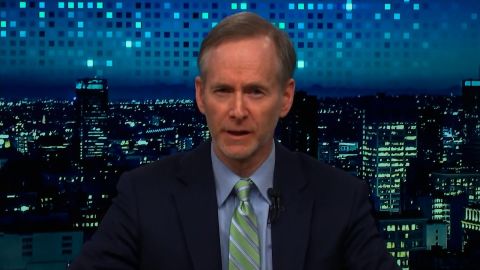Read Transcript EXPAND
AMANPOUR:
We turn now to Russia where president of Vladimir Putin has been in charge for two decades, and that means a whole generation of Russians has been dubbed the Putin generation. Joshua Yaffa is a Moscow correspondent for the new Yorker. His new book between two fires reveals how ambitious Russians from politicians to filmmakers balance their own dreams with doing what it takes to survive in this system. He told our Hari Sreenivasan of us and about how Putin maintains his rule and legitimacy in modern Russia.
SREENIVASAN:
So let’s start with a little bit of the current news. We recently had the parts of the Russian government stepped down. What, what does this mean?
YAFFA:
I think what we’re seeing is the beginning of the transition process, if it’s even fair to call it that, because I think in any transition process, Putin himself isn’t really going anywhere. He’s going to stay perhaps in perpetuity as the ultimate arbiter of the system. The one who resolves conflicts, manages relationships between various political clans and interests, but it does seem like he’s at least formally going to leave the presidency what he should do according to the constitution in 2024 so I think this a reshuffle of the government, in fact, the dismissal of the government appointment of new ministers and calls to amend the constitution. It’s not the final arrangement of power, it’s but rather the opening gambit. And what’s going to be a long chess play that should unfold really over the next year is all the way through 2024 as Putin prepares for himself a kind of soft retirement, where in fact he still remains, as I said, the highest and most authoritative political figure, but reconfigures power in such a way that he can leave the office of the presidency, prepare a new generation of leaders, but who in the end are ultimately beholden to his authority.
SREENIVASAN:
So why bother with this almost veil of democracy if he knows the government knows and ultimately the people know that he’s still the guy pulling the strings?
YAFFA:
Throughout Putin’s 20 years in power. What’s been interesting to observe is how much he cares about the veneer of democratic institutions or, or rather the veneer of a kind of legitimacy that comes from an adherence to law to process, to following the rules. Of course that, uh, is often a hollow, if not absurd idea when it is he who gets to set the rules. So following them isn’t so hard when you’re the one dictating what the rules are, but nonetheless Hooten his whole image, especially when he came to power, but really in the years that have followed has been that of someone who has restored order and functionality to the Russian state after the weakness and chaos of the Soviet collapse. And the 90s when the Russian state was a period of, of disorder disorganization and the populace was left really, uh, unsure and disoriented about their own fates and about the fate of the country as a whole.
SREENIVASAN:
You dive into some of the kind of nuances of government and the people and how they’re affected by it and how they affect it. What’s the kind of through line?
YAFFA:
You know, I started to work on the book when I realized as a journalist, there was something about Russia that I wasn’t able to say in the articles I was writing and the reporting I was doing. And I like many reporters and, and this is a very fair and correct prism for viewing Russia, but saw Putin and all the little Putin’s around him versus the people who were trapped by repressive laws, by propaganda in this cage that they couldn’t escape from but would like to. And as time went on, I began to see the, that wasn’t really capturing the whole of Russia as I was living it and experiencing it. And in fact, most people’s lives were lived somewhere in the middle. They weren’t venal corrupt, cynical officials, but nor were they brave quixotic heroic freedom fighters who were ready to Lewis everything to stand up, uh, to that system. Most people in fact, and in, and I started to feel that maybe I would have been in exactly that same position. We’re looking to reach a kind of accommodation with the system. And that act of compromise on the micro scale on the level of the individual was very fascinating to me to understand how that actually works in people’s lives, in practice and also on the macro scale, on the scale of the whole country. It seemed to me that that was a key, uh, and really interesting way to understand how the Putin system functions and why has it proved so durable.
SREENIVASAN:
I want to highlight for the audience a few of the characters that you go through. One of them is an Orthodox priest. What is he fighting? What does he settle on?
YAFFA:
Right. This is a, a priest named father Pavel as a game. He became a priest in the 1950s as a young man, and then the Soviet union, which was a nominally atheistic state, which allowed to a certain degree, the Orthodox church, uh, to exist, but, but kept it under continual pressure and tried to do everything it could to discourage a religious belief. He was eventually sent to a prison camp where he ultimately lost his leg and he emerged from that prison camp some years later with a whole trunk full of poetry that he’d written and a wooden peg leg. He ended up in a small town in Northwestern Russia school near the border with Astonia where I visited many times over the course of my reporting and became a really popular and beloved figure in Peskov who everyone seemed to respect believers and nonbelievers alike. What really worried Pavel and what became his kind of mission later in life was the growing proximity between the Orthodox church and the Putin state. In the years after Putin took power, Putin was very keen to appeal to the Orthodox state as a additional pillar of his legitimacy to somehow absorb or, or, or use the church’s own stature in society to buttress his own, you could say the church engaged in the kind of compromise on a large scale or institutional, uh, scale that I write about in on the scale of the human experience, on the scale of the individual and some of the other characters in my book, the, the church lended its aura of legitimacy to the state in exchange for all sorts of earthly, let’s say, benefits, uh, here and now, uh, state funding, uh, having church real estate that had been confiscated by the Soviet union, uh, return to it, the imprimatur of Putin who would, uh, quite publicly go to Easter services and other religious services. So it became a very convenient union, uh, of church and state and each got something useful out of it, but that really worried, uh, father Pavel adult game. He saw great dangers in that, uh, for the church. And that by tying itself to an ultimately earthly politician who can be popular one day unpopular the other day, who can do things that are perhaps virtuous and just for the population, but can do things that are unjust, uh, for the population that the church, uh, was risking a great blow to its own esteem and own moral and religious authority. And he was just about the only priest, uh, to speak up about the danger as he saw it, of, of that union. In addition to God, the church needs the blessing of Putin. Well, if it wants to, uh, expand and, uh, have the resources to do so, have the, uh, real estate, uh, to do so, to be able to say, get its teachings or lessons into Russian public schools to be able to minister in the armed forces. There are all sorts of, let’s say, earthly privileges, uh, that the church needs in order to do its godly mission. Uh, that’s, it’s that way for I suppose any religion and uh, the Putin state given its monopolistic hold, uh, over life or, or, or many aspects and sectors of life in Russia presented exactly that opportunity. I think what ultimately proved to good, to tempting for the church to resist, especially after decades of repression and marginalization under the Soviet union, the opportunity for the church to suddenly flourish and have all sorts of resources and opportunities it didn’t have for nearly a century I think was, was too tempting for the church leadership.
SREENIVASAN:
You lay out in the book that really there’s no other game in town. I mean the state is such a massive influence on the economy on whether it’s the media, whether it’s the church. What’s the other alternative if you don’t want to play ball with the state?
YAFFA:
You know, it’s a, it’s a good question and one I found myself reflecting on over and over in terms of what would I do, how would I behave in this situation? Would I really be able to say no to the opportunities on offer and pick a much harder and more uncertain life? I often came back to something that someone, um, who was a friend of the theater director could, he’ll sit up in the Cove. He’s another character in the book, really Russia’s premiere, avant garde experimental director of his age who worked not only on the theater stage but also in film, who for awhile benefited from the Putin States. Ultimately temporary interest in supporting avant garde art forms. And his fall from grace was quite dramatic. He ended up later accused of embezzlement and found himself under house arrest facing a number of years in prison. And as one of his friends was trying to narrate his rise and fall. And how did he allow himself to get so close to the state in the first place for someone who in fact had no real enthusiasm for the Putin state? Quite the opposite internally. So that having the Cove was, I think an anti Putnis. It’s fair to say someone whose sympathies lie with the opposition, but nonetheless, he did quite well and accepting large amounts of, of state grants and state resources to make his creative projects. And as this friend said to me, you know, in Russia, it’s not as if you have a choice of making a film with state money or without state money. That would be an easy choice. Sure. Make the film without state money, do it on your own independently. But in Russia, the choice is, do you want to make a film or not? And when I understood it that way, I began to look at Sudan that comes predicament differently, but also the predicament of lots of people I saw all around me. So even the Cove had these talents. He had this vision, he had this experience. Why shouldn’t he want to realize that in the form of films? That’s a totally noble, understandable goal. And to do that though, it required this, uh, unavoidable in some senses, inevitable, uh, cooperation with the state. And I think that’s what makes this notion of compromise, which is otherwise universal, which I see in my own life. And I see in the life of my friends and colleagues, gives it a particular Russian cast because the state is so ever present, uh, really omnipresent. Uh, in Russia, wherever you turn, whatever you are, professional field or interest is, you can be an Orthodox priest like Pavel adult game, or you can be an avant garde theater director. Like could, he’ll sit up in the Cove sooner or later you butt up against the state and have to decide for yourself where and in the service of, what am I willing to compromise
SREENIVASAN:
How much of this do you think is, serves this state to have a class of people or a group of people who are, its critics so that they can point and say, no, I don’t own the press. Look, look at this guy. He writes horrible stuff about me all the time. And the character that you mentioned from the play, he was able to almost create subversive content, lay it out on a stage in front of an audience full of high government officials would just kind of watch it and move on with their lives.
YAFFA:
Right, the early years of Putinism especially were almost defined by exactly that dynamic that you highlight. There was a kind of big tent, aspirational idea behind Putinism that we can have militaristic nationalists and avant garde theater directors. And that’s all somehow part of the overall system because that’s the, ultimately the important thing, right? That this, that the system retains its, uh, stability. And one way it does so is by kind of inclusiveness, of course, to a point, someone who’s an actual on the street rabble rousing a organizer and critic of Putin doesn’t necessarily have a place in that tent. Someone like a Alexei Navalny who is emerged as the country’s, uh, most popular opposition leader. But that dynamic has narrowed, uh, in recent years, and that’s shown in the lives of the characters. I write about someone like Sadana Cove, the theater director, who for awhile was celebrated by the Putin state by given resources and, and, and his plays were put on the largest stage stages in Russia, the Bolshoi theater, uh, and others as the window and tolerance, uh, of the Putin state for these diverse, uh, at some times, uh, seemingly quasi oppositional, uh, voices has narrowed. So to have the opportunities for people like said, having the Cove and other people, uh, in my book, it’s actually become harder to do the kinds of compromises that I write about. You can’t manage your relationship with the state in this kind of nuanced, clever way where you’re a little bit in, but not all the way. Now the Putin state is really forcing people to choose and it’s possible that strategically as for the longterm stability of that system, that’s not really an advantageous, uh, posture for the state to have.
SREENIVASAN:
You know, 10 years ago I might’ve asked you the question, do you see Russia becoming more like the U S and now I also have to ask the question, do you see the U S becoming more like Russia in some ways?
YAFFA:
Sadly, absolutely. Especially, uh, I think here, if my time with Constantine Ernst, the head now of channel one Russia’s main state network, he really narrated to me his own intellectual journey. He said to me in the Soviet times, I like so many people were really frustrated by all the limitations of the Soviet state. We were young people with ideas. And ambitions and we couldn’t realize them. And uh, that angered us. And we presumed that everything in the Soviet union’s adversary, the West America, most of all somehow must be 180 degrees, uh, different there things should be milk and honey. Exactly. But then after the collapse of the Soviet union, the collapse of the iron curtain, he had the opportunity to travel to experience America and the West as it actually existed. He grew disappointed. It wasn’t actually the land of milk and honey, but there all sorts of problems, deficiencies, hypocrisy. He’s a in America and American foreign policy. And his takeaway was to become essentially a cynic about the world at large. Every place, uh, is just as fallen, uh, as the next. And there is no land of milk and honey. And I see that kind of thinking creeping in, uh, to the American political discourse. Uh, each side is equally corrupt. Each side is equally culpable. All facts have equal weight. So what’s the point in even trying to parse them? That’s the great and ultimately successful strategy of channel one and really Russian propaganda in the age of Putin. They don’t try and convince viewers of Russia’s unique in particular greatness. Rather, the message is, sure, the Russian state may be corrupt in certain ways. Sure, the Russian state may commit this or that violation. But look at the violations that America commits. Look at the hypocrisy of Europe. Look at the failures of the Western order. We’re all equally culpable. We’re all equally to blame. Then there’s no real point in trying, uh, to isolate, to identify one state or another for coming in for kind of particular or exaggerated, um, blame and all versions of events carry equal weight. I saw that with how channel one reacted to the shutdown of MH 17. A plane flying over Eastern Ukraine from Amsterdam to Kuala Lumpur that was tragically shot down out of the sky. And, uh, the summer of 2014 we now know it seems pretty clear based on international investigations led by the Dutch that, uh, the plane was shot down by a Russian anti aircraft system that was given surreptitiously and covertly from the Russian military to the separatists. It was backing. But on channel one, you heard all manner of contradictory, even absurd versions about what had happened, none of them, uh, holding a kind of coherent logic.
YAFFA:
It couldn’t actually be A and B and C because all the versions were contradictory. The point being to leave the viewer in such a state of exhaustion and disorientation that he or she simply threw her hands up and said, it’s so impossible to make sense of the truth here. I give up. And also that Dutch version of events, which seems to be by far the most credible one, ends up in that same froth, that same informational soup. It has no more or less weight than all those other absurd versions purposely put out on channel one to muddy the waters. And that kind of purposeful strategic campaign of disorientation and exhaustion of the viewer, sadly also is beginning to feel recognizable here in, uh, the American media environment.
SREENIVASAN:
All right, Joshua Yaffa, “Between Two Fires” is the book. Thanks so much for joining us.
YAFFA:
Thanks for having me.
About This Episode EXPAND
Heidi Heitkamp discusses a new revelation in the Senate impeachment trial, Dr. Tom Inglesby addresses growing fears over the coronavirus, Jemele Hill reflects on Kobe Bryant’s remarkable and complicated legacy and Joshua Yaffa analyzes Putin’s rule in modern Russia.
LEARN MORE



